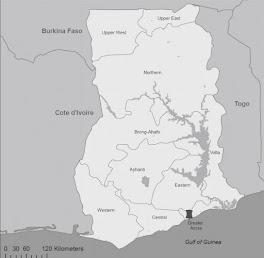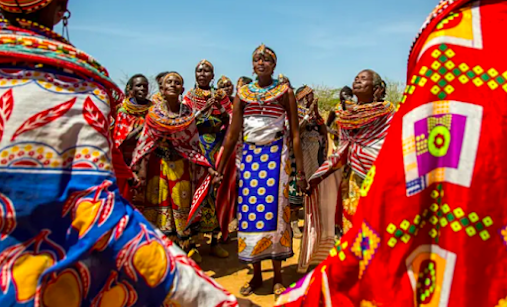My previous blog post pointed out that every day, women and girls spend 200 million hours collecting water (UNICEF, 2016). Today I will focus on Ghana, a country located in Sub-Saharan Africa with a population of 24 million (Nuages and Strand, 2015). Here, women and girls spend roughly 16 million hours hauling water daily - the opportunity cost of those hours is alarming (Bintaayi Jeil et al. 2020). I can’t help but think about how else women could spend their time; what are the implications of such responsibilities? Why does this burden fall so disproportionately on women and girls? A recent study conducted in Ghana’s northern district of Tatale-Sanguli explores the gendered implications of water shortages, and I have used it to inform this blog post (Bintaayi Jeil et al. 2020).
Maps of Ghana
What is “Time Poverty”?
‘Time Poverty’ explains how the time spent by women on ‘domestic chores’ such as water collection and purification can be represented as ‘significant forgone income’ (
Costa et. al. 2009), implying that if adequate water supplies were to be put in place, women could have more time to earn money. This could not only alleviate income poverty and offer financial autonomy but also grant women with more decision making power in the household. It should be noted that domestic labour is often unmonetized and ‘invisible’ in its contributions towards capitalism and measurements of economic activity (
McDowell, 2014), however, one study found that when including unpaid domestic labour in its calculations, 20% of women in Ghana work over 112 hours per week while only 2% of men work for this length of time (
Costa et al. 2009). Women that do find time to work in Ghana often work in agricultural activities, brewing pito, or hairdressing (
Bintaayi Jeil et al. 2020); professions that all require water, emphasising how many women’s lives revolve around the resource.
It is thought that across Ghana, women spend on average 23 minutes for each round trip on foot, with the most common water sources being public taps (20-27%), boreholes or public wells (29-39%) (
Nuages and Strand, 2015). That being said, there is wide-spread disparity across the country; 65% of female participants in the northern region of Tatale-Sanguli said that they spend three to four hours daily during periods of water scarcity (
Bintaayi Jeil et al. 2020), and on-site access to water can vary from 56% of households (in the capital region of Greater Accra) to less than 10% in many of the Sahelian Upper Eastern regions (
Nuages and Strand, 2015).
Why women?
Why is it, that women bear this responsibility in the first place? Traditional values and patriarchal cultural norms position women as the main caretakers of children, providers of food and water, and maintainers of the home (
Bintaayi Jeil et al. 2020). By contrast, women often have far less domestic decision-making power, regardless of the disproportionate amount of work that they do. The study in Tatale-Sanguli found that 92% of male respondents did not see water provision as their responsibility (
Bintaayi Jeil et al. 2020). It was also noted that on the critical occasion that men would help haul water, for example when women were pregnant or unwell, they would often use ‘bicycles, motorbikes or tricycles’, further displaying how water access is unequal (
Bintaayi Jeil et al. 2020).
Education
Research has shown that improving water supplies does not always increase labour market participation for women (
Costa et al. 2009), for example, many women use the extra time to sleep (
Bintaayi Jeil et al. 2020). This is partly due to the gendered nature of employment opportunities and discrimination that women face, but also due to lower levels of education on average. The issue of gender inequality and uneven water access starts from as young as 5 years old, as young girls are often pulled out of school to aid their mothers with water collection (
Nuages and Strand, 2015), detrimentally impacting their employment prospects for adult-life. A 2008 Domestic House Survey in Ghana found that 66% of those fetching water were women, 15% were girls under 17, and 9% were boys under 17 (
Nuages and Strand, 2015). This graph shows the positive correlation between increasing water hauling time, and decreasing school attendance for girls between 5-15 in Ghana:
Whether it be to sleep, to attend school, to earn an income, or to protect oneself from the physical and mental exhaustion that water-hauling demands, the opportunity cost of the time that women spend collecting water is immense. It is clear that gender inequality persists, and that it is strongly reflected in the arduous task of fetching water.





This is a really informative post Heather. The use of Ghana as a case study, and statisitics used really highlight the impact of time poverty. Well done
ReplyDeleteThank you Laila!
DeleteThis is once again a well-written blog post. I didn't realise how much of a burden collecting water can be on women, but your blog post made me realise how big of an issue it is to much of the Global South. I think it was very smart for you to focus on Ghana as a specific example, as it allowed you to go into a great amount of detail. Of course this will be a difficult problem to solve, but how do you think the burden on women can be eased? Is it deep rooted in patriarchy or is it something that is cultural? Perhaps there is a need for education? It would be nice to get your perspective on a potential solution for Ghana and other countries with a similar plight.
DeleteThank you Nasir! I have elaborated more on future posts, however, I do think, as you said, that a large contributor is the patriarchal system in which women often have to navigate in order to access their basic rights. As a result of this cultural, systemic, disadvantage, women in many parts of the world have to succumb to men and their husbands, and carry out their "female responsibilities" - an issue which is highly reflected in women's relationship with water. Education would definitely help resolve this! For both empowerment and on the importance gender equality.
Delete